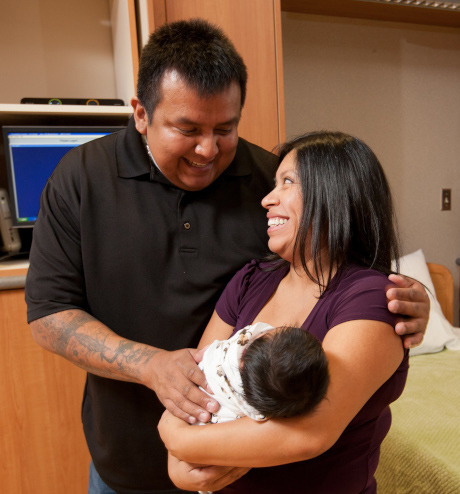
In the world of parenting, age 35 seems to be the perceived finish line for having babies. Many women think that if they haven't given birth by that age, they're "too old" to have a healthy pregnancy.
Providers have long referred to pregnancy after age 35 as "pregnancy of advanced maternal age." But, while pregnancy risks do increase with age, there is no switch that flips, skyrocketing risk at age 35. Most women can have a safe, healthy pregnancies in their 30s – 50s.
In fact, the age at first pregnancy in the U.S. has been trending older for several years. In 2006, the average age of a first-time mom was 24.9, according to the Centers for Disease Control and Prevention (CDC). In 2018, the average age was 26.9.
Our patients at UNM Health have babies later in life for many reasons. Some tell us they wanted to save money, establish a career or find the right partner before having babies. Others struggled with fertility issues and have had trouble getting pregnant. Still others are surprised by an unexpected pregnancy when they thought they were in pre-menopause.
In any case, the OB/GYNs and certified nurse-midwives at UNM Health can give you the information and support you need as an expecting older mom. Whether it's your first, second, or third pregnancy (or more!) we can help you have a happy healthy pregnancy after 35.
Let's start by sorting through the risks for older pregnancies, and then we'll discuss what to expect during pregnancy.
Risk Factors for Older Moms
Certain health conditions become more common as people age. Some of these include high blood pressure and diabetes, both of which can harm a pregnancy. The risk of pregnancy complications such as these also increases as a woman ages:
- Chromosomal abnormalities (birth defects such as cystic fibrosis or Down syndrome)
- Low birth weight
- Miscarriage or stillbirth
- Preeclampsia (high blood pressure in pregnancy)
- Premature birth
Older moms are more likely to give birth to multiples (twins, triplets, or more), sometimes as a result of using infertility treatments to get pregnant. With multiples, the risk of needing a cesarean delivery is higher, which means a longer recovery.
All this might sound scary. But if you were generally healthy when you got pregnant, you’ll most likely have a healthy pregnancy. And if you are planning to become pregnant, talk with your doctor about ways to optimize your health before conceiving.
Planning for a Healthy Pregnancy Later in Life
Think about prenatal screenings and tests
Some pregnancy testing is strongly recommended. Some of these include ultrasound exams to monitor your baby's growth and blood tests to screen for certain health conditions in a woman.
Other tests are available if you choose them, such as genetic screening tests. There are different genetic screening tests available. Each are performed at certain times in a pregnancy and can help evaluate whether your baby might have Down syndrome, spina bifida or another chromosomal condition. It's not an exact test—it only indicates your risk level.
More invasive tests can give more definitive answers. None of these tests are mandatory, and we will respect your decisions. Talk with your provider about options so you can make the best choice for you.
Amniocentesis uses a needle inserted through your abdomen and into your uterus. Using ultrasound to guide the needle, the doctor will remove a small amount of fluid from around the baby to test for genetic diseases. This test can be done between 15 and 20 weeks of pregnancy.
We can also test a sample of placenta cells for genetic abnormalities using chorionic villus sampling between 11 and 14 weeks. A relatively new blood test called cell-free DNA testing is another option to check for chromosomal issues between 10 and 22 weeks of pregnancy. Not all insurers cover these tests. Be sure to check with your insurance provider ahead of time.

Keep Making Healthy Choices During Pregnancy
Schedule a preconception checkup with your doctor to help optimize your health before pregnancy. At this appointment, you can get up to date on your immunizations and talk with your provider about your health history and needs, such as taking prenatal vitamins and whether to consider genetic testing.
Control chronic health conditions
If you have diabetes, high blood pressure or another long-term health condition, talk with your doctor about your current treatment. They might recommend trying a different medication or dosage before or after pregnancy.
Check your weight
Being overweight or underweight can make it tough to get pregnant. Your weight can also cause health problems during pregnancy, such as nutrition problems, high blood pressure, and low or high birth weight.
Your provider can help you determine a healthy weight for your age, body type and lifestyle. We can give you the information and support you need to achieve a healthy weight before pregnancy.
Stop unhealthy habits
It can be tough to give up smoking, drinking alcohol or using other substances. But quitting can increase your chances of having a smooth pregnancy and healthy newborn. UNM Health offers a special program just for expecting moms who need help to overcome addiction. Contact our Milagro program for supportive, confidential care today.
Choose the best provider and hospital for you
When it comes time to getting prenatal care, look for a provider and hospital that are prepared to care for you and your baby. You want a team that knows the latest information and respects your values, needs and preferences.
As the state's only academic medical center, UNM Health takes care of patients from all walks of life across New Mexico. We see patients with the most complex needs because we have the expertise and resources to provide advanced care.
UNM Children's Hospital is home to a 24/7 neonatal intensive care unit (NICU), which means we are prepared to handle any maternal or newborn health emergency at any time.
It's important to keep making healthy choices after you become pregnant. Here are a few ways to help you stay active and healthy as you wait for the new baby to arrive.
- Get prenatal care. Visiting your OB/GYN or midwife regularly during pregnancy can help identify health problems earlier when they are easier to manage.
- Exercise It doesn’t need to be a high energy activity, but consistency is key. Modified yoga, water aerobics, jogging and walking are safe for most women during pregnancy. Check with your provider before trying new activities.
- Eat a balanced diet. Aim to eat plenty of fruits, vegetables, whole grains, beans, lean meats, and low-fat dairy. While the old adage is "eating for two," you really need only about 300 extra calories a day for a single-baby pregnancy. Stay hydrated by drinking at least eight glasses of water a day.
- Try to get more sleep. Changing hormone levels can cause fatigue and sleep problems during pregnancy. To get more Zzs, use your bedroom only for sleep and sex. Avoid electronics for at least an hour before bed, and cut caffeine after noon.
- Spend time with your squad. There is something special about pregnancy talks with supportive friends. During COVID-19, it can be a challenge to get together face-to-face, so consider regular phone or video chats. Some women enjoy virtual support groups on social media or the web to get advice and share stories.
- Go easy on yourself. Rest if you’re tired and ask for help when you need it. Your body is going through changes that can zap your energy some days, and it's OK to accept a helping hand now and then.
As an older mom, your pregnancy experience will be similar in many ways to a younger mom's journey. With a focus on your health and the support of an expert OB/Gyn team, you can improve your chances of having a healthy pregnancy in your late 30s, 40s or 50s.
To visit with an OB/GYN or midwife, call 505-272-2245 and request an appointment today.

